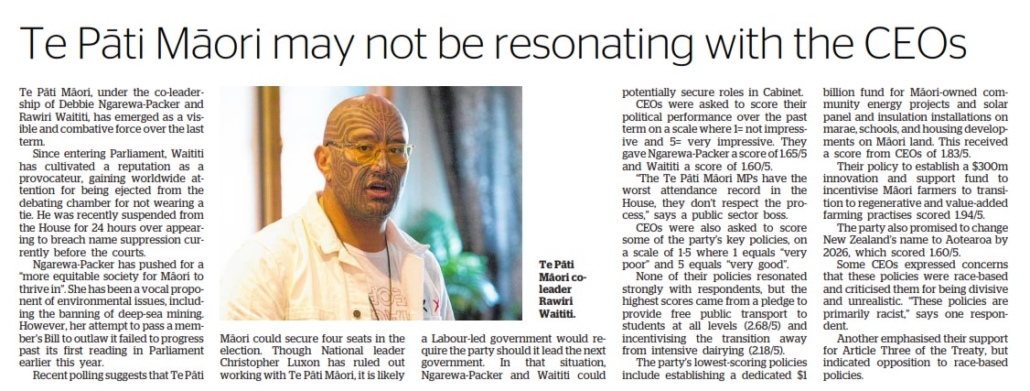Mood of the Boardroom: Te Pati Māori may not be resonating with CEOs (NZ Herald)
Te Pāti Māori, under the co-leadership of Debbie Ngarewa-Packer and Rawiri Waititi, has emerged as a visible and combative force over the last term.
Since entering Parliament, Waititi has cultivated a reputation as a provocateur, gaining worldwide attention for being ejected from the debating chamber for not wearing a tie. He was recently suspended from the House for 24 hours over appearing to breach name suppression currently before the courts.
Ngarewa-Packer has pushed for a “more equitable society for Māori to thrive in”. She has been a vocal proponent of environmental issues, including the banning of deep-sea mining. However, her attempt to pass a member’s Bill to outlaw it failed to progress past its first reading in Parliament earlier this year.
Recent polling suggests that Te Pāti Māori could secure four seats in the election. Though National leader Christopher Luxon has ruled out working with Te Pāti Māori, it is likely a Labour-led government would require the party should it lead the next government. In that situation, Ngarewa-Packer and Waititi could potentially secure roles in Cabinet.
CEOs were asked to score their political performance over the past term on a scale where 1= not impressive and 5= very impressive. They gave Ngarewa-Packer a score of 1.65/5 and Waititi a score of 1.60/5.
“The Te Pāti Māori MPs have the worst attendance record in the House, they don’t respect the process,” says a public sector boss.
CEOs were also asked to score some of the party’s key policies, on a scale of 1-5 where 1 equals “very poor” and 5 equals “very good”.
None of their policies resonated strongly with respondents, but the highest scores came from a pledge to provide free public transport to students at all levels (2.68/5) and incentivising the transition away from intensive dairying (2.18/5).
The party’s lowest-scoring policies include establishing a dedicated $1 billion fund for Māori-owned community energy projects and solar panel and insulation installations on marae, schools, and housing developments on Māori land. This received a score from CEOs of 1.83/5.
Their policy to establish a $300m innovation and support fund to incentivise Māori farmers to transition to regenerative and value-added farming practises scored 1.94/5.
The party also promised to change New Zealand’s name to Aotearoa by 2026, which scored 1.60/5.
Some CEOs expressed concerns that these policies were race-based and criticised them for being divisive and unrealistic. “These policies are primarily racist,” says one respondent.
Another emphasised their support for Article Three of the Treaty, but indicated opposition to race-based policies.
